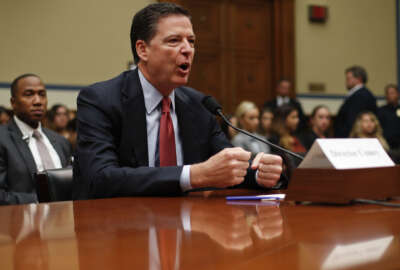Toni Savage started her career with the Army Corps of Engineers in Huntsville, Alabama, as a high school and then college intern. She rose the ranks from a GS-3 to a GS-13, becoming a top procurement specialist for the agency.
She said her colleagues at the Corps of Engineers became her family, and she consistently earned top marks on her performance evaluations for years. But those rankings started to fall when Savage blew the whistle on a large Army contracting program in 2007.
“The years I spent working late hours, taking assignments others refused [and] working from home, all to build a career for myself was yanked away when I refused to go along with the fraud, waste and abuse in my organization,” she said at the National Whistleblower Center’s event in Washington. “Fraud…was allowed to continue by the agency’s executive leadership and attorneys.”
A Merit Systems Protection Board judge did agree that the Corps of Engineers’ actions were “discriminatory whistleblower offenses,” but the MSPB judge did not acknowledge all of the retaliation that Savage experienced.
“I stand here today, 10 years after this ordeal began and seven years after I was illegally terminated, still fighting the injustice that I suffered at the hands of my employers,” she said.
Savage was one of many whistleblowers that members of Congress and oversight agency leaders honored July 27 during a National Whistleblower Day celebration in Washington.
“With the attack on the free press, with the attack on the first amendment that we have seen in the last few months, your work has never been more important,” Sen. Ron Wyden (D-Ore.) said.
Members of Congress praised the whistleblower community, but they acknowledged that lawmakers still have a lot of work to do to improve protections for those who come forward.
Senate Judiciary Committee Chairman Chuck Grassley (R-Iowa), a longtime champion for whistleblower rights, introduced a resolution commemorating National Whistleblower Day. Every member of the bipartisan Senate Whistleblower Protection Caucus co-sponsored the resolution.
Grassley said he’s written a letter to every president since Ronald Reagan, asking that they hold an official ceremony honoring whistleblowers in the White House Rose Garden. No president yet has taken Grassley up on his idea.
Though there’s largely bipartisan support for whistleblowers and the waste, fraud and abuse they expose, members of Congress say there’s more work to do.
For example, Wyden said he’d like to improve whistleblower protections for employees at the FBI.
Under Grassley’s leaderhsip, Congress passed an abridged version of the FBI Whistleblower Protection Enhancement Act at the very end of 2016, but the law lacks the teeth it needs to make a difference for current FBI whistleblowers still waiting years for action on their case.
Several lawmakers said reauthorizing the Office of Special Counsel, which hasn’t received congressional authorization in years, is another priority. Members of Congress also want the Senate to quickly confirm Henry Kerner, the president’s nominee to be the U.S. Special Counsel and lead OSC.
The Senate Homeland Security and Governmental Affairs Committee reported Kerner’s nomination favorably, but it still awaits a full Senate vote.
While he waits, Kerner said he’s been listening to the whistleblower community.
“As I’m meeting whistleblowers like yourselves, I’m just learning about what animates you, what makes you go forward, what are the priorities and what do you want OSC to do?” he said. “As I’m learning about that, I feel very confident that I’ll be able to bring a lot of that to bear in that position once the Senate confirms me, hopefully.”
Meanwhile, other members of Congress, like Rep. Kathleen Rice (D-N.Y.) see an opportunity to create more incentives and reward programs to prompt whistleblowers to step forward and expose what they know.
The IRS said it’s seeing some success with its own whistleblower office.
The agency made 418 awards to whistleblowers worth $61 million dollars in fiscal 2016, said Lee Martin, director of the IRS Whistleblower Office. Whistleblower claims themselves rose 6 percent in 2016 over the previous year.
Since the IRS created a whistleblower office in 2007, the agency recovered $3.4 billion and awarded $465 million to those reported waste, fraud and abuse.
Yet both Martin and Wyden acknowledged there’s more the agency can do to improve the program.
“We are committed to improving communications with whistleblowers,” Martin said. “Whistleblower submissions are now acknowledged [and] claim numbers are now assigned and mailed to whistleblowers generally within 30 days of receipt. Administrative proceedings are now being started at the earliest date allowed by law.”
Savage and other whistleblowers who spoke Thursday described the sense of community they feel when they hear others tell their own stories.
Rep. Mark Meadows said he’s also felt the same sense of community. When he first joined the House Oversight and Government Reform Committee, he created a place on his website where whistleblowers could notes and messages about their challenges.
Since then, the number of responses have been overwhelming. Whistleblowers have found his personal phone number and call him on nights, weekends and his wedding anniversary to tell Meadows their stories. He said he — and his wife — take them seriously.
“Keep the cards and letters and phone calls on every day, other than [my wedding anniversary] coming my way, and we will be your advocate,” Meadows said. “If you feel like you’re not getting a fair shake, let me know [and] let our committee know, and I promise I’ll follow up.”
Copyright
© 2024 Federal News Network. All rights reserved. This website is not intended for users located within the European Economic Area.

